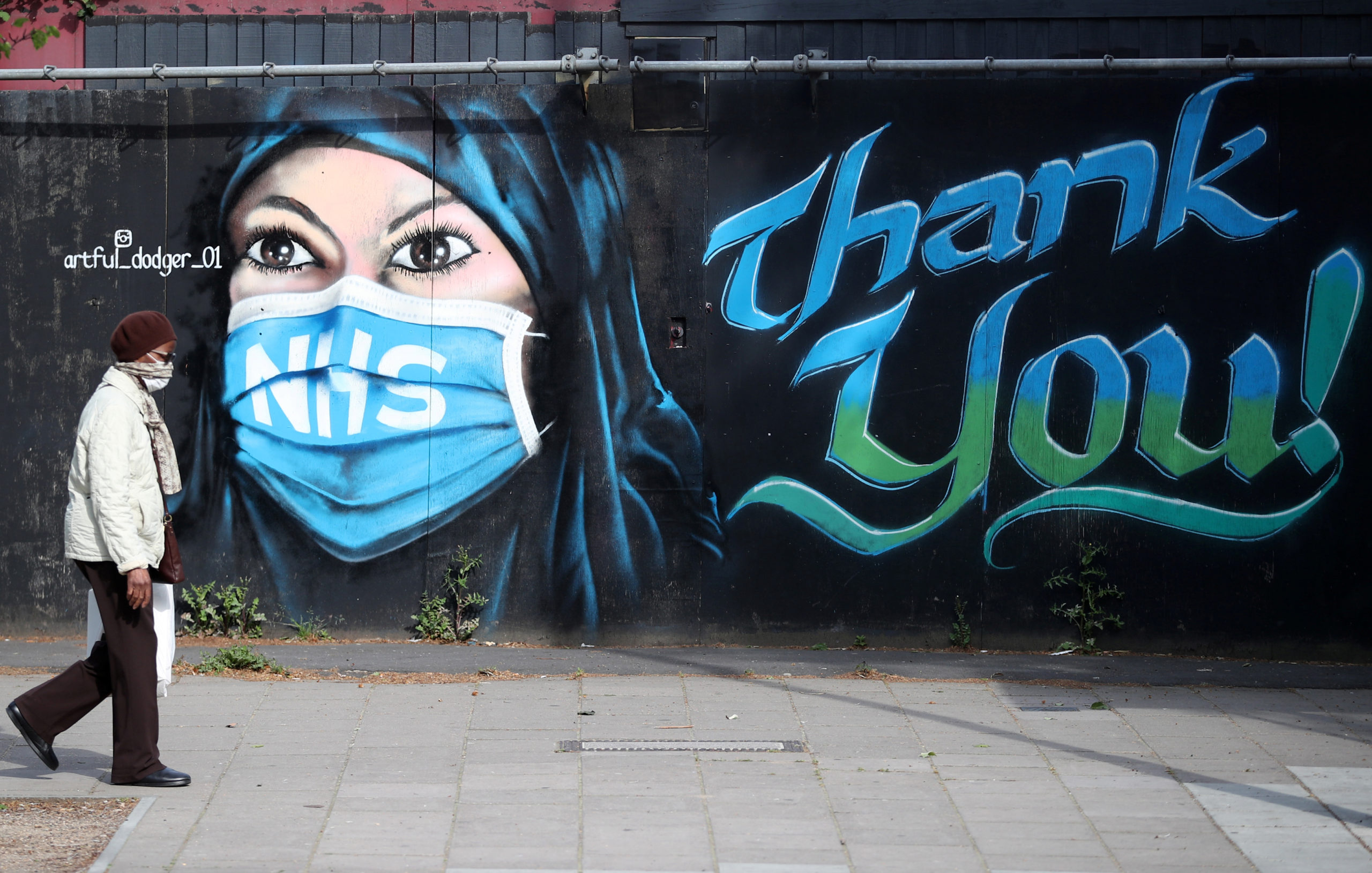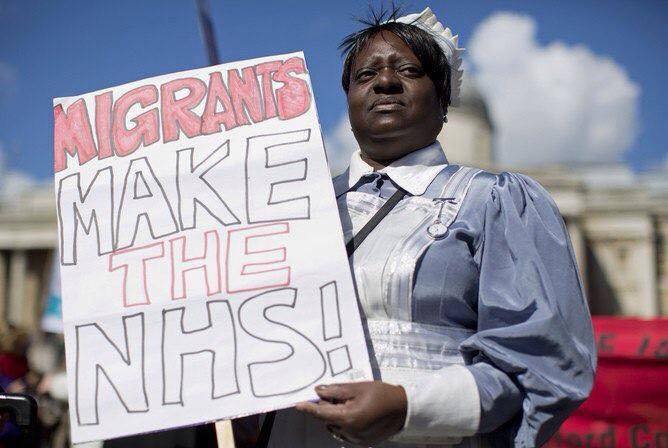
The death of George Floyd has sparked a wave of Black Lives Matter protests around the world and with it a discussion around Britain’s own involvement in slavery and the glorification of its colonial past.
With many NHS trusts, officials and health professionals ready to voice their support for the movement, we must capitalise on this moment to ensure that meaningful steps are taken to dismantle racism in our healthcare system.
To do this, we must look beyond patient outcomes and at the broader picture of our healthcare system in understanding how such structures and ideas are propagated and upheld in every area and at every level of the system.
These health inequities, founded in structural racism, and exposed by coronavirus, will only continue to be exacerbated without real commitment to change.
The hostile environment.
The NHS’s complicity in the government’s hostile environment policy against immigrants, which is embedded in our healthcare system, is just one example of how Britain continues to benefit from its colonial legacy. Looking at the list of NHS staff from outside the EU: Indian (25,809), Filipino (22, 043), Nigerian (8,241), Pakistani (4,313), Zimbabwean (4192), Ghanaian (2863) – it’s clear that Britain’s ties with its ex-colonies remain strong.
Health care professionals are often actively recruited to come and work in the NHS from such countries, thus strengthening our health system, while diminishing those of the less affluent countries that are left behind.
Indeed, the UK benefits from a greater number of health professionals per head of the population than most of its former colonies and boasts an average life expectancy of around 80 years. Meanwhile, in Nigeria, that figure is only 53 years, and in India, 67.

Despite immigrants making up a significant proportion of NHS staff (13.3% of non-frontline staff and 28% of doctors), when patients from these countries seek healthcare in the UK they are charged, often unrealistic and disproportionate amounts.
This is done either through the health surcharge (£400 per family member per year) or at the inflated rate of 150% cost of the treatment they seek. For example, it costs £10,000 for a caesarian section, £16,000 for hospital stay and £54,000 for cancer treatment.
These actions work to widen global inequities and uphold colonial power structures, through charging and creating additional barriers to accessing healthcare, further damaging the health of those from countries with weaker health systems.
An analysis of the nationalities of those made to pay for treatment as part of the government’s “charging of overseas visitors guidance” has highlighted that patients from former British colonies make up a significant proportion of those targeted.
These toxic policies not only cause harm to migrants but to British foreign-born nationals and their families, along with British Black, asian and ethnic minority communities as well.
This can be seen when looking at maternal deaths within the UK. A report by Oxford University found that Black women were four times more likely to die than white women during childbirth in the UK.
Whilst the reasons for this will be multifactorial, including racial bias and an increased risk of certain conditions such as pre-eclampsia, a report by Maternity Action, a charity that focuses on the health of pregnant women, found two cases in which fear of being charged was linked to maternal death.
Meanwhile, the Windrush scandal revealed that many British citizens from Black and ethnic minorities were incorrectly denied care as a result of the government’s hostile environment.
This was not an accident: the Department of Health acknowledged the risk to the Black, asian and ethnic minorities in the UK in a 2015 equality assessment. Despite this, little action was taken to protect these groups, making them collateral damage in the pursuit of ever more aggressive immigration policies.
Unlearning prejudice.
Medical education is another example of how racism is inbuilt into and shapes our healthcare system. From the very outset of their medical careers, practitioners are made to encounter racist stereotypes and biases.
The case studies we are taught in medical school are a prime example of this: “Mohammed is from Pakistan and has a cough and fever at night”, “Lubanzi is from South Africa and is experiencing recurrent chest infections”.
Designed to aid learning through pattern recognition, these vignettes rely on embedded stereotypes. Both examples imply infectious disease based on higher prevalence within those countries, the first, TB and the second HIV. Despite having very little context most medical students would likely guess the diagnosis from the first half of the sentence.
Teaching medical professionals to use such stereotypes as a diagnostic tool encourages simplistic race-based and potentially inaccurate diagnosis. And as students become clinicians, who write protocols and algorithms, these biases become entrenched, lending weight to the idea of genetic, rather than social difference.
Violent erasures.
Understanding racist histories behind medical advances is also often overlooked. From the Tuskegee syphilis experiments in the US, which saw Black Americans experimented on under the pretence of free medical care and dying as a result, to the “living laboratory” of the African continent, in which European scientists made medical advances without acknowledgement or consent of the host populations, physicians have long been complicit in enforcing state violence.
Despite this, such practices do not feature on our medical curriculum despite helping to shape current medical practice. The violent erasure of these histories prevents us from acknowledging the brutal nature of medicine’s colonial past.
The decolonising contraception collective is an excellent example of healthcare professionals, along with others working in sexual health, tackling the legacy of colonialism in reproductive health through addressing barriers to access, preconceived ideas around reproductive rights and dismantling the gender binary.
Similar practices must be applied across every area of the NHS, and worked into the curriculum, to help create more thoughtful and critically-minded healthcare practitioners.
Structural racism in the NHS.
Within medical training, the links between ethnicity and differences in attainment, prizes, and job promotions have all been well-documented. Over 25 years ago, seminal research showed ethnic minority doctors were less likely to be hired into speciality training and today that gap still exists.
Black and other ethnic minority doctors are more likely to have a complaint made against them, more likely to have these complaints upheld and more likely to be reprimanded. This is exemplified in the case of Hadiza Bawa-Garba, a Nigerian Muslim junior doctor found guilty for manslaughter by gross negligence. While Bawa-Garba was demonised by the UK press, the white male consultant – and her superior – who was also on duty escaped charges.
Despite this, institutional racism is still not acknowledged as an issue by many clinicians. The toxic mixture of personal biases (both conscious and unconscious), institutional silence and a lack of education on these topics all serve to create barriers to meaningful action.
Indeed, the effects of structural racism are brought sharply into focus by the disproportionate number of NHS workers from ethnic minorities dying of coronavirus.
One analysis found that out of 200 NHS staff who have died during the pandemic, 60% were from an ethnic minority background – many of those immigrants – despite making up only 13% of staff. These doctors not only gave their lives for the NHS; they were forced to pay for the ‘privilege’ through the supposedly scrapped NHS surcharge.
Demanding change.
While the prime minister apparently “hears” the Black Lives Matter protests, it appears they have fallen on deaf ears, with Johnson continuing to hand out lucrative contracts to outsourcing company Serco for the NHS’s coronavirus “track and trace” system, whose treatment of detained migrants includes paying as little as £1/hour for cleaning.
Meanwhile, a recent report by Public Health England on coronavirus deaths in Black and ethnic minority communities failed to mention institutional racism as a contributing factor.
As a result, it is blindingly obvious that another commission – a tool of inertia, under the pretence of action – is not what we need to actually change things. As health professionals, fleetingly elevated to the status of heroes during this pandemic, it is therefore up to us to demand real change.
Jo Dobbin & Rahma Abdi are junior doctors in London and members of migrant solidarity group, Medact. They volunteer with CARAS, an organisation that provides support for refugees and asylum seekers in south-west London. Jo works as part of the safe surgeries team for Doctors of the World.